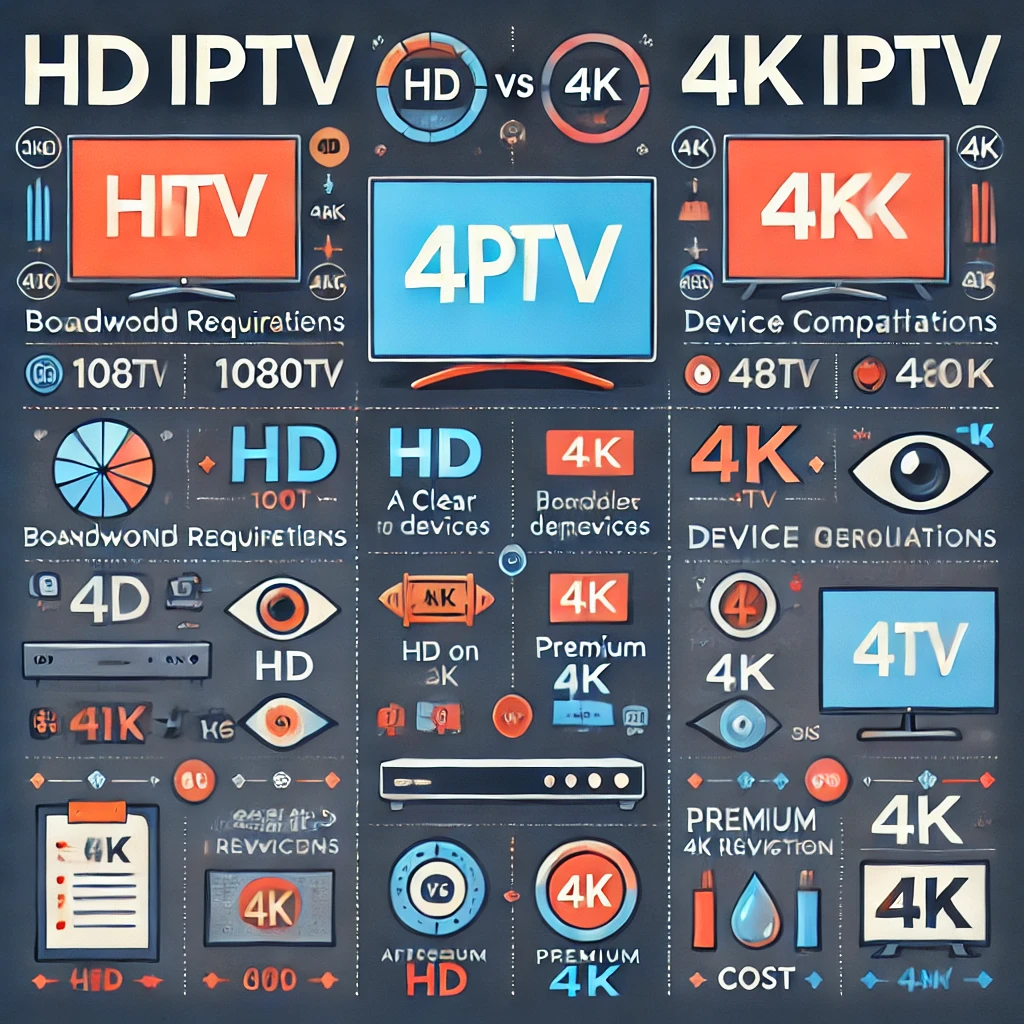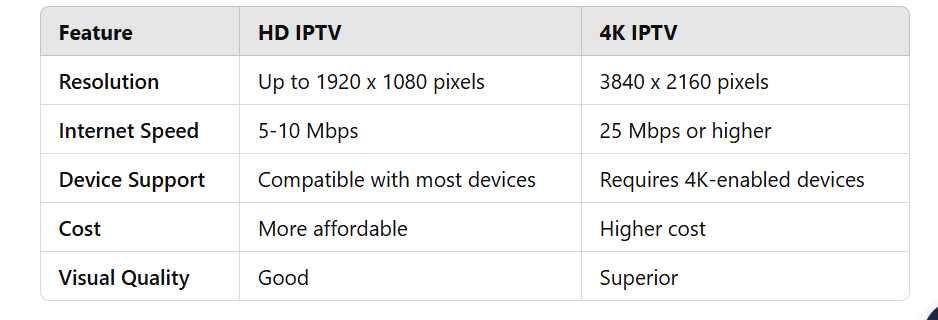How Does HD IPTV Compare to 4K IPTV?
In the ever-evolving world of digital entertainment, IPTV (Internet Protocol Television) has become a cornerstone of modern viewing experiences. With advancements in streaming technology, HD (high-definition) IPTV and 4K IPTV have emerged as popular choices for consumers. However, how do they compare? This article explores the differences between HD IPTV and 4K IPTV, helping you make an informed choice based on your needs.

Understanding HD IPTV
HD IPTV delivers video content with a resolution of 1280 x 720 pixels (720p) or 1920 x 1080 pixels (1080p). It is widely adopted for its excellent balance of quality and bandwidth efficiency. Here are some key features of HD IPTV:
Benefits of HD IPTV
Widespread Compatibility: Compatible with most devices, including older TVs, smartphones, and streaming boxes.
Efficient Bandwidth Usage: It requires lower internet speeds, making it accessible to users with average internet connections.
Cost-Effective: Generally more affordable than 4K IPTV, making it a great choice for budget-conscious users.
Limitations of HD IPTV
Lower Visual Quality: While impressive, the clarity and detail of HD content cannot match the immersive experience of 4K.
Limited Future-Proofing: HD might eventually feel outdated as 4K technology becomes the norm.
Understanding 4K IPTV
4K IPTV streams content at a resolution of 3840 x 2160 pixels, offering four times the detail of HD. Consequently, it is ideal for viewers who demand the highest picture quality and own compatible devices.
Benefits of 4K IPTV
Stunning Visuals: Provides incredibly sharp and detailed images, making it perfect for large-screen TVs and home theaters.
Future-Proof Technology: As 4K content becomes more prevalent, investing in 4K IPTV ensures you stay ahead of the curve.
Enhanced Features: Often includes HDR (High Dynamic Range) for richer colors and better contrast.
Limitations of 4K IPTV
High Bandwidth Requirement: It requires a robust internet connection, typically 25 Mbps or higher, for seamless streaming.
Higher Cost: Generally more expensive than HD IPTV, both in subscription fees and required hardware.
Device Compatibility: Only works with 4K-enabled devices, limiting its accessibility for some users.
Key Differences Between HD IPTV and 4K IPTV

Choosing Between HD IPTV and 4K IPTV
Deciding between HD IPTV and 4K IPTV involves evaluating several factors, including your preferences, budget, and technical capabilities. Therefore, understanding their strengths will help you make a better choice.
Why Choose HD IPTV?
HD IPTV is an excellent choice for many users due to its accessibility and affordability. Moreover, it works seamlessly with a wide range of devices and doesn’t require a high-speed internet connection, making it ideal for casual viewers or those with limited resources.
Internet Connection Requirements: HD IPTV requires an internet speed of only 5-10 Mbps, making it a practical choice for areas with slower broadband.
Compatibility: Works on older TVs, smartphones, and streaming devices without requiring hardware upgrades.
Cost: Subscription costs are lower, providing great value for viewers on a budget.
Content: While the picture quality is slightly lower than 4K, HD IPTV still delivers clear and vibrant visuals suitable for most viewing experiences.
Why Choose 4K IPTV?
4K IPTV represents the pinnacle of modern streaming quality, perfect for those who want an immersive and visually striking experience. However, it comes with specific requirements to unlock its full potential.
Stunning Picture Quality: With four times the resolution of HD, 4K IPTV is ideal for large-screen TVs and delivers an ultra-sharp, cinematic experience.
Future-Proofing: As 4K content becomes more widely available, investing in 4K IPTV ensures your system remains compatible with evolving trends.
Internet Speed Needs: To stream 4K content smoothly, you’ll need a stable internet connection of at least 25 Mbps.
Device Compatibility: 4K IPTV requires a 4K-capable television or streaming device to fully enjoy the benefits.
Enhanced Features: Many 4K IPTV services include HDR (High Dynamic Range), providing richer colors and improved contrast for a dynamic viewing experience.
Which Option Is Right for You?
Here are a few key questions to consider:
Do you own a 4K-compatible TV or device? If not, HD IPTV may be the better choice for now.
What is the speed and reliability of your internet connection? If you cannot consistently reach speeds of 25 Mbps, HD IPTV will provide smoother streaming.
Are you seeking affordability, or are you willing to invest in the best picture quality available? HD IPTV is budget-friendly, while 4K IPTV caters to premium viewing needs.
Ultimately, the decision depends on your viewing habits and the resources you have available. As a result, choose HD IPTV for practicality and cost efficiency, or opt for 4K IPTV to enjoy a cutting-edge, immersive experience.
Final Thoughts
Both HD IPTV and 4K IPTV offer unique advantages, and the right choice depends on your individual needs. Indeed, HD IPTV is perfect for those seeking affordability and accessibility, while 4K IPTV caters to viewers who value cutting-edge technology and superior visuals. Furthermore, understanding the differences allows you to choose an IPTV service that enhances your entertainment experience.
For more insights on IPTV trends, tips, and technology, stay tuned to our blog!

